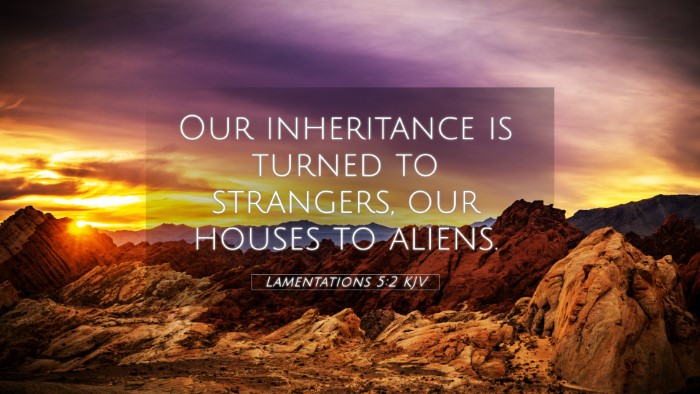Lamentations 5:2 - Meaning and Interpretation
Lamentations 5:2 states: "Our inheritance is turned to strangers, our houses to aliens."
This verse encapsulates the profound sorrow and desolation experienced by the Israelites after the fall of Jerusalem. The lament vividly illustrates their loss—not just of land and home, but also of identity and security. To understand this verse fully, we turn to insights from Matthew Henry, Albert Barnes, and Adam Clarke.
Summary of Insights
Matthew Henry's Commentary
Matthew Henry emphasizes the devastation of the Israelites, focusing on their feelings of dispossession and alienation.
He notes that the "inheritance" which was once a sacred gift from God has been stripped away, leading to a profound sense of loss.
The "strangers" and "aliens" symbolize not just foreign oppressors but also the broader loss of their covenant community and identity.
Henry reflects on how this verse portrays the collective grief of a people whose relationship with God has been shattered.
Albert Barnes' Commentary
Albert Barnes highlights the theme of bereavement in Lamentations 5:2.
He discusses how the change from having an inheritance to living among strangers represents a radical shift in circumstances for the Israelites.
Barnes draws a connection to God's promises regarding the land, emphasizing that their current state reflects God's judgment.
He encourages readers to view this loss as both a historical event and a cautionary tale about forsaking God's ways.
Adam Clarke's Commentary
Adam Clarke provides a detailed analysis of the social implications of this verse.
He notes that the "inheritance" refers to more than just physical territory; it encompasses their cultural and spiritual legacy.
Clarke points out the significance of the phrase "houses to aliens," stressing how this loss forces the Israelites to confront their dislocation in both earthly and heavenly contexts.
He suggests this is indicative of a broader divine purpose and plan, calling believers to seek restoration through repentance.
Cross-Referenced Bible Verses
To further understand the themes in Lamentations 5:2, we can explore several related Bible verses:
- Psalm 106:40-41: Reflects on the consequences of Israel's sin and their subsequent captivity.
- Deuteronomy 28:43-44: Speaks of how foreigners will rise up against Israel as a result of disobedience.
- Jeremiah 17:4: Details the disinheritance and forsaking of the land due to transgression.
- Isaiah 64:10-11: Laments the desolation of Jerusalem and the loss of the Temple, paralleling the themes in Lamentations.
- Ezekiel 33:24: Confirms the loss of land and promises of restoration, tying back to the consequences of their actions.
- Romans 11:11: Discusses the implications of turning away from God and its effect on national identity.
- Hebrews 11:9-10: Points to the idea of seeking a heavenly inheritance, contrasting earthly loss.
Thematic Connections
The connections between Lamentations 5:2 and these cross-referenced verses point to overarching themes in the Bible:
- Loss and Restoration: Highlighted through various prophetic and lamenting texts that speak to Israel's disinheritance and God's promise of restoration.
- Covenant Relationship: The disruption of the covenant community and its implications for identity and security are echoed throughout Scripture.
- Judgment and Mercy: The interplay between divine judgment and the potential for mercy underscores many passages, emphasizing the need for repentance.
Application of Insights and Cross-References in Study
For anyone conducting a cross-reference Bible study, understanding Lamentations 5:2 within a broader context engages with numerous biblical themes:
alienation, lost identity, and the hope of restoration. By utilizing a Bible concordance or a Bible cross-reference guide, readers can explore these themes in deeper detail.
This method also allows for identifying connections between the Old and New Testament, such as God's faithfulness despite human unfaithfulness.
Conclusion
Lamentations 5:2 serves as a poignant reminder of the consequences of straying from God while also illuminating the hope found in His promises.
Through careful comparative analysis and cross-referencing biblical texts, believers can enrich their understanding of Scripture and apply its lessons meaningfully in their lives.











